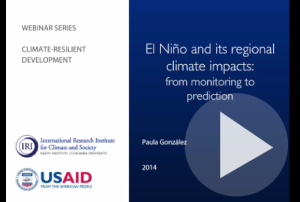IRI’s New El Niño Webinars
A new set of training webinars developed by the International Research Institute for Climate and Society tackles the ins and outs of El Niño and La Niña and their impacts around the world.
The new videos, available in both English and Spanish, are the latest in the Climate Concepts for Development series produced by the IRI with support from the U.S. Agency for International Development. They are designed for development professionals who want to be more fluent in the science that underpins their climate adaptation projects and decision making.
An El Niño event is likely to develop in late 2014, with the potential for major impacts around the world. El Niño refers to the periodic warming of the eastern and central Pacific Ocean surface waters around the equator. Its counterpart is La Niña, defined by cooler-than-normal sea-surface temperatures in the same region. Even though El Niño and La Niña start in the Pacific, their disruption of normal ocean and atmospheric patterns can lead to significant consequences for temperature, rainfall and vegetation in areas far away from the Pacific.
The IRI is one of the world’s leading research institutions on El Niño. Each month, it provides a suite of forecasts, analyses and resources developed in partnership with the National Oceanic and Atmospheric Administration’s Climate Prediction Center.
In the first webinar, IRI climate scientist Paula González discusses the science behind El Niño, in an accessible way for development professionals and decision makers. She discusses how El Niño is monitored, how it can impact remote regions around the world and how scientists can model and predict these impacts months ahead of time.
In the second webinar, Erica Allis, a senior staff associate at IRI, describes how past El Niño events have impacted countries like Peru and Indonesia, and some ways that governments and development practitioners can help communities prepare.
Both webinars are available on IRI’s training website.


You must be logged in to post a comment.